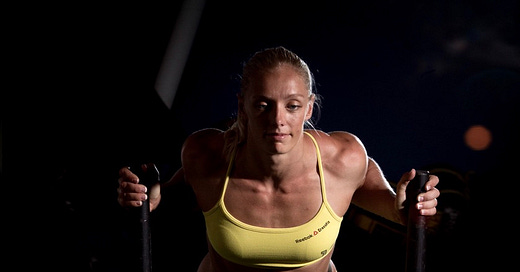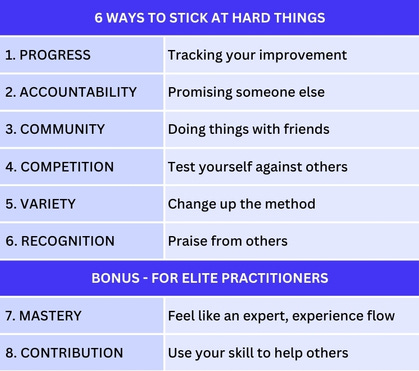Making things stick: 6 ways to make doing hard things (like exercise) addictive
As an athlete everyone assumes we have crazy willpower to workout everyday. I'll let you in on a secret - it's not only habits, and not just discipline. We love hard things. Here's how you can too.
Hard things are hard to stick at
Lots of easy things are addictive.
Social media, junk food, TV, video games, caffeine, alcohol, drugs, shopping, checking your emails, checking your Slack, watching YouTube.
They are addictive because the reward is immediate. You get the dopamine hit straight away.
Lots of hard things are hard to stick at.
Exercise, stretching, learning a language, working on a new skill, deep work, saving money, eating healthy, meditating, reading, writing.
They are hard because the reward is delayed. You don’t see any benefit until months later.
So, how do we hack our human brains to make hard things just as sticky as easy things?
The secret isn’t more discipline
The most common question I get as an athlete: ‘Have you been to the Olympics?’
The 2nd most common: ‘How do you have the discipline to stick to training every day?’
Training up to 11 sessions a week seems like a Herculean effort of willpower to most people. Over a 30 year career, I’ve done more than 10,000 training sessions. 25,000 hours of practice.
The big secret is… it’s not willpower.
‘I don’t want to go on holidays,’ I was 12 when I told my family this.
‘What?’ my dad was baffled. ‘But it’s holidays.’ Doesn’t every kid want to miss school for vacation?
‘I’ll miss training,’ I said.
‘You’ll only miss a few sessions,’ said my mum. ‘And your coach is ok with you going away.’
‘But I love training. I don’t want to miss ANY sessions.’
The beginning of the year is where we all try new habits, commit to challenges, and promise ourselves that this year we will do the thing (the same thing we promised ourselves we’d do the last 3 years too…)
What if you felt about exercise - or any other hard thing - the same way I felt at 12 about training sessions. You loved it so much it felt easy?
6 ways to make hard things addictive
Here’s the list:
Progress
Accountability
Community
Competition
Variety
Recognition
Let’s dive in to the detail of how you can unlock ALL of these.
1. Progress: Tracking your improvement
Duolingo invented ‘streaks’ for digital products (hear the story here). Right now, 8 million people have a streak of 365 days or longer. They also have a beautiful ‘knowledge tree’ where you can visually see everything you’ve learned in a language to date. Duolingo know that feeling a sense of progress is the most powerful way to make hard things - like learning a new language - addictive.
Boost your sense of progress by:
Track, track, track your metrics
Using streaks to not miss a day
Breaking big goals into much smaller goals you can tick off
“Momentum is a powerful force; once you build it, it drives you forward effortlessly.” ~ Michael Jordan
2. Accountability: Promising someone else
Who is someone you respect and don’t want to let down? For me it’s always been my coach. A great coach shares your disappointment when you lose in sport. But they are only disappointed in you when you don’t give your full effort.
I’ve promised my coach I’ll show up to training every day. I’ve promised them I’ll never give up during a match. I’ve promised them I’ll give 100% even on the days I’m tired and sore. There is no chance I’m breaking those promises.
Boost your sense of accountability by:
Choosing the person you most respect to be accountable to
Have a way for them to know if you are adhering or not
Be accountable to more people. For example your broader peer group, or even social media
“Losers make promises they often break. Winners make commitments they always keep.” ~ Unknown
“Motivation gets you started. Accountability keeps you going.” ~ Jim Rohn
3. Community: Doing things with friends
I’ve done over 25,000 training sessions as an athlete. You know what I still struggle to do? Go to the gym and workout alone. I’m not joking. I have a fully equipped, brand new gym in my apartment building and I still pay a membership to workout elsewhere so I can be surrounded by people. Sport is inherently social - teammates, coaches, fans, competitors - and that’s why it’s sticky.
Boost your sense of community by:
Having at least one close friend you commit to things with
Joining a club, team or community
Inviting people to join you
“We rise by lifting others.” ~ Robert Ingersoll
“Community is where transformation happens - not in isolation, but in connection.” ~ Krista Tippett
4. Competition: Test yourself against others
‘Have fun,’ my mum used to say every time I went off to a competition as a kid.
‘Winning is fun,’ I would reply.
It’s become a joke in our family. But there is truth in every joke. We all like to win. We all find a little extra motivation when it’s a race or contest.
Boost your sense of competition by:
Signing up for challenges
Entering a competition
Creating a friendly rivalry
Making things a contest or game with your mates
“Competition pushes individuals to exceed their own expectations.” ~ Mia Hamm
5. Variety: Change up the method
Boredom is the great killer of good intentions. It’s the reason I’ve never managed to stick at meditation. Every time I sit down it’s just… the same. And yet CrossFit has kept me coming back for 13 years, because every single day the workout is different.
Boost your sense of variety by:
Changing the location occasionally
Using new techniques or methods
Switching anything else up - your program for exercise, your recipes for eating healthy, your study time for learning, your mantra for meditation etc.
“If we get total certainty, we get… bored out of our minds. So, God, in Her infinite wisdom, gave us a second human need, which is uncertainty. We need variety. We need surprise.” ~ Tony Robbins
6. Recognition: Praise from others
Standing on top of the podium never gets old. Compliments on our skill, effort or achievements always feel good. Being selected for the team is always a source of pride. While external recognition as your only source of motivation isn’t healthy, it definitely part of the mix for making hard things sticky.
Boost your sense of recognition by:
Telling your friends what you are proud of so they’ll cheer you on
Tracking your progress publicly
Being the best at something. You don’t have to win, you could be the most consistent, most joyful, or most likely to give 100%
“There is more hunger for love and appreciation in this world than for bread.” ~ Mother Teresa
For advanced practitioners - 2 bonuses
I’ve done more than 25,000 hours of training for sport in my life. In the beginning, the above 6 things made me love showing up.
As I reached an elite level, I unlocked two more.
7. Mastery: Feel like an expert, experience flow
Back somersault tuck. 10 reps.
Back somersault pike. 10 reps.
Back somersault layout. 10 reps.
Front somersault half twist in tuck. 10 reps.
Front somersault half twist in pike. 10 reps.
Front somersault half twist in layout. 10 reps.
Every single Monday for 17 years - the entire length of my trampolining career - I started with the basics. Striving for perfection. I loved it. And I loved it because I was really good at it. An expert. Doing something near perfectly is rewarding for its own sake.
Boost your sense of mastery by:
Focusing on doing the basics perfectly
Optimising for flow, and keeping your mind in the present moment
Looking back at how far you’ve come
“It is rarely a mysterious technique that drives us to the top, but rather a profound mastery of what may well be a basic skill set.” ~ Josh Waitzkin
7. Contribution: Use your skill to help others
‘But they’ve played for Australia! I’ll never beat them.’ I was helping out a young beach volleyball player, a talented teenager that didn’t realise how good she was.
‘I remember the first time I played an Olympian,’ I said
‘What happened?’ they asked. Eyes wide.
‘I got crushed,’ I laughed. ‘I didn’t even make it to 10 points.’
‘Oh,’ I could see her deflate.
‘And I remember the first time I beat an Olympian too. Want to know how?’
‘Yeah!’ she leaned in, ready to hear secrets.
Boost your sense of contribution by:
Having a larger purpose that benefits others - not just you
Teaching and mentoring others
Using your platform to speak up for others
“True motivation comes from knowing your work impacts someone else's life.” ~ Simon Sinek
Summary
Hard things are hard to stick at. We’ve all failed at a new habit. What if you LOVED what you were doing so much you didn’t need discipline at all?







